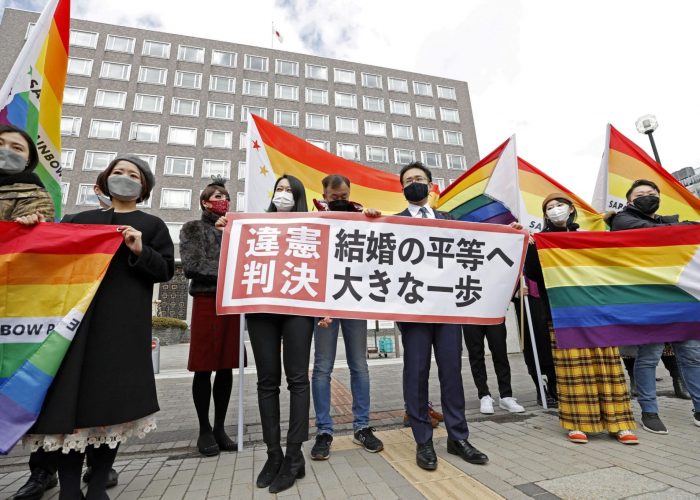Author: Yasuo Takao, Curtin University
In the parliamentary session that ended on 16 June 2021, Japan failed to pass a much anticipated bill to promote understanding of the LGBTIQA+ (lesbian, gay, bisexual, transgender, gender diverse, intersex, queer, asexual and questioning) community. The ruling Liberal Democratic Partys (LDP) Special Mission Committee on Sexual Orientation and Gender Identity formulated draft LGBT legislation, which addressed concerns from the main opposition Constitutional Democratic Party and others. While the law was expected to be passed before the Tokyo 2020 Olympic Games, the LDP ultimately decided not to submit the bill.
A small number of conservative LDP lawmakers objected to the bill, warning of the danger of a collapse of family values. Another obstacle was political interference. Senior LDP members openly expressed their concerns that enacting the bill during the Diet session would not help the LDP to shore up its conservative voter base in the lead up to the 2021 lower house election.
Even the enactment of the now shelved cross-party bill that simply requires the government to promote understanding of LGBT people, would still leave a long way to go before full inclusivity is achieved. This type of anti-discrimination provision is classified as a bottom performing normative measure by the OECD. Japan is one of the three lowest-performing OECD countries and the only country in the G7 that has not legalised same-sex marriage. Japan is yet to enact policies to promote LGBTIQA+ inclusivity, such as the prohibition of discrimination in employment, protection against violence and equal adoption rights.
The importance of social inclusion for sexual minorities is now commonly supported among the general public. According to Dentsu Diversity Labs 2018 LGBT Survey of 60,000 people, 78 per cent of respondents were in favour of legalising same-sex marriage. This is a major leap compared to a support rate of 51 per cent in 2015.
The use of litigation as a conflict-solving mechanism is also common among minority groups in Japan. Japans judicial system provides minority groups with an institutionalised opportunity to have a considerable impact on public opinion. In March 2021, a district court in Sapporo became the first to rule that the government’s failure to recognise same-sex marriage is unconstitutional as it violates Article 14 of the Constitution that ensures the right to equality.
Policymaking towards LGBTIQA+ inclusivity in Japan has often been localised as the LDP government is reluctant to back a new redistribution of social values. Local communities are at the forefront of addressing the problems that same-sex couples face in their day-to-day lives, such as co-signing of tenancy agreements for rental housing, hospital visitation and medical decision-making rights for partners.
In March 2015, Shibuya, one of Tokyos 23 city wards, passed the Ordinance for Promoting Respect of Gender Equality and Diversity in the Ward to issue same-sex partnership certificates. The number of local governments that followed suit increased from 22 in 2019 to 100 by April 2021, which had a major impact on public opinion of same-sex marriage in Japan.
Though these partnership certificate systems have no legal basis, they offer practical solutions for day-to-day problems. Local chief executives can guide or recommend businesses, hospitals, real estate firms, schools and individuals to treat certificate holders in the same way as married couples. They could even threaten to publicly name and shame violators. The certificates function as de facto legally binding instruments and deter discrimination.
The impact of the institutionalisation of same-sex marriage accelerating overseas is clear to Japan’s Ministry of Justice, which is taking incremental steps in line with global trends. In May 2019, the Ministry of Justice overturned a deportation order for a Taiwanese man who illegally overstayed his visa, taking into account his 25-year partnership with a Japanese man. In August 2019, a Southeast Asian woman who was in a 17-year relationship with a Japanese man became the first transgender person to receive a special residential permit in Japan. Between 20132020, 93 residents of foreign nationality were granted permission to bring their same-sex spouses to the country under a special visa. While the national bureaucracy tends to align itself with the agenda of the LDP and refrains from overhauling conservative policy, it has shown a willingness to make incremental adjustments.
The LDP’s ruling elites do not wish to be seen as latecomers, and are prone to yield to international pressure. In order to avoid potential damage to Japans international reputation, the LDP may be persuaded to pursue same-sex marriage legislation at the national level. But as conservative political groups are likely to drag the socially-divisive issue of family values into party politics, same-sex marriage has the potential to become a divisive issue in the upcoming national election.
Major industry groups and large companies which the LDP has worked closely with may play a critical role in moving LGBTIQA+ policies. International business organisations in Japan have increasingly adopted inclusive LGBTIQA+ policies, which are considered a source of competitive advantage. The LDP’s electoral success requires it to take these business incentives into consideration.
For lasting and successful policy, public trust is a necessity. In the 2016 Lower House election, the LDP referred to promoting understanding of sexual diversity in its manifesto. This was unimaginable a decade ago. In the longer term, pressure will mount on the government to yield to public opinion in support of inclusive LGBTIQA+ policies.
Yasuo Takao is Adjunct Senior Research Fellow at the School of Media, Culture and Creative Arts at Curtin University, Perth.read more
Baby steps towards LGBTIQA+ inclusivity in Japan


